Ethiopia is a country with a rich heritage and immense economic potential. With its bustling sectors ranging from agriculture to tourism, the opportunities are numerous for those looking to engage in trade in this vibrant nation. Identifying the most lucrative trades can be key to tapping into what Ethiopia has to offer.
Agriculture remains the cornerstone of Ethiopia’s economy. Coffee, cereals, and pulses are some of the leading commodities, contributing significantly to the nation's GDP. The fertile land and extensive farming tradition create a thriving environment for agriculture-based businesses.
As the world moves towards digital transformation, Ethiopia’s technology sector is catching up. Government initiatives and the rise of tech hubs are driving growth in this area, making it an increasingly important arena for trade and investment.
The textiles and apparel industry, steeped in tradition, is modernizing to meet global standards. Ethiopian fabrics are renowned for their quality, and there is a growing market for locally produced goods both domestically and overseas.
Ethiopia’s rich history and natural beauty make tourism a rapidly growing sector. From ancient historical sites to breathtaking landscapes, the tourism industry offers vast potential for those willing to invest in promoting and developing the country's attractions.
- Agriculture: The Backbone of Ethiopian Trade
- Emerging Technology Sector
- Textiles and Apparel: Traditional yet Modern
- Tourism: Unlocking Ancient Wonders
Agriculture: The Backbone of Ethiopian Trade
Agriculture is undeniably the cornerstone of Ethiopia’s economy. The nation’s fertile lands and favorable climate conditions make it ideal for farming. Ethiopian farms produce a diverse range of crops, including staples like teff, coffee, and pulses, which form the backbone of exporting commodities. The country is Africa’s largest coffee producer and one of the key suppliers of specialty coffee in the world.
Coffee agriculture not only supports the economy but also serves as a cultural touchstone, with traditional coffee ceremonies playing a vital role in social life. Ethiopia's coffee sector employs millions, making it critical for sustaining livelihoods. According to the Ethiopian Coffee and Tea Authority, the country generated over $900 million from coffee exports in the fiscal year 2021-2022.
In addition to coffee, Ethiopia excels in the production of cereals and pulses. These grains are essential for both domestic consumption and export. The country is a leading producer of teff, which is the main ingredient for injera, a staple bread in Ethiopian cuisine. This grain's high nutritional value and gluten-free benefits have been gaining international attention, opening new markets and business opportunities.
Ethiopia’s agricultural sector is also characterized by livestock farming. The country has one of the largest livestock populations in Africa, including cattle, sheep, and goats. This has fostered a booming dairy and meat industry, providing both local and international markets with high-quality products. The rich biodiversity and varied climatic zones allow Ethiopia to cultivate numerous horticultural products, including vegetables, fruits, and flowers.
Emerging initiatives such as the Agricultural Transformation Agency (ATA) aim to modernize the sector. Their goal is to increase productivity and market access for smallholder farmers, leveraging modern farming techniques and technologies. According to ATA, these efforts led to a 20% increase in crop production over the last five years.
Mekonnen Manyazewal, a leading agricultural expert, once said,
"Ethiopia's future is deeply rooted in its fertile soil. Empowering our farmers with modern tools and market access is key to sustainable growth."This sentiment captures the essence of the country’s dedication to evolving its agricultural practices.
In summary, agriculture not only supports Ethiopia's economy but also its cultural and social fabric. Investments and innovations in this sector promise to yield economic advancements and improved quality of life for millions of Ethiopians. Agricultural trade remains a significant avenue for growth, driven by the country's deep-rooted farming traditions and promising newer developments.
Emerging Technology Sector
Ethiopia is stepping into the future with its budding technology sector. Over the past decade, the country has shown significant progress in embracing digital solutions and fostering technology-driven businesses. This sector is rapidly evolving, spurred by government efforts, private investments, and a growing number of tech-savvy entrepreneurs determined to innovate.
The Ethiopian government has played a pivotal role in this transformation by launching initiatives aimed at improving digital infrastructure and connectivity. For example, the government’s “Digital Ethiopia 2025” strategy outlines ambitious plans to broaden internet access and integrate digital solutions into various facets of life, spanning from healthcare to education. This strategy aims to create a more inclusive economy by enabling access to technology for the broader population.
A notable development in the technology sector is the rise of tech hubs and incubators, which are essential for nurturing startups and driving innovation. One such hub, Iceaddis, is recognized as one of the leading tech incubators in Ethiopia. It provides essential support and resources for young entrepreneurs to develop and scale their businesses. Through networking opportunities, mentorship programs, and access to funding, Iceaddis has been instrumental in turning ideas into viable businesses.
From fintech to agritech, Ethiopian startups are exploring various domains. Fintech startups are particularly promising, with companies like YenePay and HelloCash revolutionizing financial transactions and promoting financial inclusion. These platforms enable secure and convenient payment options, helping to bring more people into the formal financial system. Agritech startups, on the other hand, are leveraging technology to improve agricultural productivity and sustainability. For instance, platforms like Hello Tractor connect smallholder farmers with tractor owners, streamlining farming operations and enhancing productivity.
The educational sector is also benefiting from technological advancements. Digital learning platforms and online courses are making education more accessible, especially in remote areas. Initiatives like Gebeya’s online training programs aim to equip the youth with marketable skills in software development and IT, thereby bridging the skill gap and preparing a competent workforce for the digital economy.
The World Bank recognizes Ethiopia's potential, stating, "Digital technologies can help to transform Ethiopia by creating jobs, improving service delivery, and increasing access to education and health services."
Investment opportunities in Ethiopia's technology sector are expanding. The country's commitment to improving ICT infrastructure, coupled with a youthful population that is eager to adopt new technologies, makes it a fertile ground for investments. Foreign investors are starting to take notice, and collaborative ventures between local and international tech companies are on the rise, fostering knowledge transfer and innovation.
Despite the significant strides, challenges remain. Issues such as limited internet penetration, high cost of services, and regulatory hurdles can impede growth. However, continuous efforts by the government and private sector to address these challenges are painting a brighter future for Ethiopia's tech landscape. As the country navigates these hurdles, the technology sector is set to unlock new dimensions of economic growth and societal development.
Textiles and Apparel: Traditional yet Modern
Ethiopia’s textiles and apparel industry is a fascinating blend of deep-rooted traditions and modern innovation. The country is celebrated for its high-quality, hand-woven fabrics, which are often made from locally sourced cotton. These traditional methods set Ethiopian textiles apart on the global stage, providing a unique selling proposition that cannot be easily replicated by industrial giants.
Historically, the country has been known for its stunning garments, such as the intricately woven shema cloth used in traditional dress. This heritage continues to influence contemporary fashion trends and even high-end designer collections worldwide. Ethiopian designers are drawing from their rich textile history to create modern apparel that appeals to both local and international markets.
In recent years, the Ethiopian government has identified the textile and apparel sector as a key area for economic growth. With the establishment of industrial parks dedicated to textile manufacturing, the country aims to capitalize on its heritage while incorporating modern production techniques. These parks are designed to attract foreign investment and improve the overall production capacity of the sector.
One of the most notable initiatives is the Hawassa Industrial Park, which has already attracted major global brands looking to source ethical and high-quality products. These investments are helping the local industry to modernize and scale up operations, thereby creating job opportunities and boosting the economy.
A significant advantage for Ethiopia is its participation in preferential trade agreements, such as the African Growth and Opportunity Act (AGOA), which allows duty-free exports to the United States. This has opened up lucrative markets for Ethiopian textiles and apparel, further driving growth in the sector.
"Ethiopia is becoming a key player in the global textile industry due to its blend of skilled craftsmanship and increased production capabilities," says Seleshi Bekele, the Director of Tekle Textile Enterprises.
There are several key factors contributing to the success of Ethiopia's textiles and apparel sector. Firstly, the country's abundant raw materials, particularly cotton, reduce dependency on imports and keep costs low. Secondly, Ethiopia's young and dynamic workforce is eager to engage in the growing textile industry, providing a stable labor pool for businesses.
In addition, technology is playing a crucial role in transforming the industry. From advanced loom machinery to computerized pattern-making, modern techniques are being seamlessly integrated with traditional methods. This fusion not only enhances productivity but also ensures that Ethiopian textiles retain their unique cultural essence while meeting international quality standards.
Looking ahead, the future of Ethiopia’s textile and apparel sector appears promising. Continued investments in infrastructure, coupled with the preservation of traditional skills, position Ethiopia as a hub for high-quality, ethical, and economically viable textile production. Those interested in the sector will find ample opportunity, supported by a rich cultural backdrop and a forward-thinking approach to modernization.
Tourism: Unlocking Ancient Wonders
Ethiopia is a country that truly opens a gateway to ancient wonders. With a history that traces back to the very dawn of civilization, this land is teeming with remarkable sites and experiences. A major draw is the ancient city of Aksum, once the capital of the Aksumite Empire. Here, colossal obelisks stand tall, and legends suggest that the Ark of the Covenant is housed in the Church of St. Mary of Zion.
One cannot overlook Lalibela, a UNESCO World Heritage site revered for its rock-hewn churches carved directly out of the cliffs. These 11 monolithic structures were commissioned in the 12th century and are a testament to Ethiopia's rich cultural and religious history. Visitors often feel a deep sense of reverence walking through the tunnels and passages that connect these churches.
The Simien Mountains National Park offers another splendor, a natural marvel combining stunning landscapes with unique wildlife. Known as the 'Roof of Africa,' the park is an ideal spot for trekking and seeing species like the Gelada baboon, which are found nowhere else on Earth. The lush scenery juxtaposed with rugged cliffs provides a breathtaking visual experience.
Rich Cultural Heritage
In addition to natural beauty, Ethiopia is rich in cultural traditions. The annual Timkat Festival, celebrating Epiphany, draws thousands of tourists every year. Its vibrant processions, during which replicas of the Ark of the Covenant are paraded through the streets, offer a glimpse into the country's deep religious roots. Joining such a festival offers an immersive experience into local customs and communal spirit.
Relishing Ethiopian cuisine is a must. Dishes such as 'injera'—a sourdough flatbread—and 'doro wat'—a spicy chicken stew—provide an authentic taste of the region. Many travelers find that sharing a meal this way, often accompanied by aromatic coffee, serves as an introduction to the Ethiopian way of life.
"Ethiopia's cultural heritage is one of the richest in sub-Saharan Africa. Its unique festivals, historic buildings, and traditional food attract travelers seeking an authentic experience." - Lonely Planet
Economic Potential
The tourism sector in Ethiopia is not just about showcasing beauty and history; it harbors significant economic potential. According to reports, the tourism industry has created job opportunities for millions of Ethiopians, ranging from tour guides to hospitality workers. The Ethiopian government has also been actively investing in infrastructure to support this burgeoning sector, recognizing its importance as a revenue generator and a means to promote cultural heritage.
Investment in infrastructure has been crucial to supporting an increase in tourist numbers. Airports are being modernized, and roads are being improved to make even remote locations accessible. This increase in accessibility is making Ethiopia an increasingly attractive destination for both adventure and cultural tourism.
In summary, the tourism sector in Ethiopia offers much more than dazzling landscapes and historic sites. It provides an authentic dive into the culture, a taste of unique traditions, and opportunities for economic development. For the traveler and entrepreneur alike, Ethiopia's ancient wonders and growing potential make it a compelling destination.
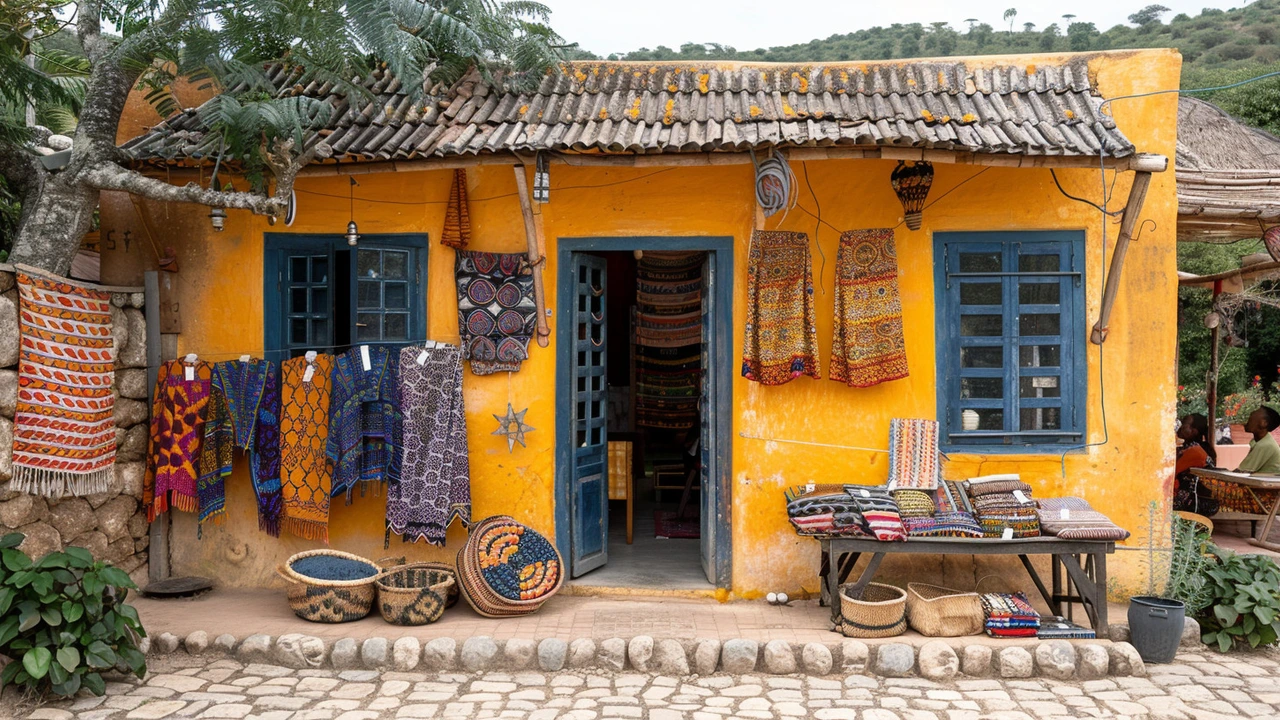
 Exploring the Wealthiest Regions of Ethiopia: A Closer Look at the Country's Most Prosperous Areas
Exploring the Wealthiest Regions of Ethiopia: A Closer Look at the Country's Most Prosperous Areas
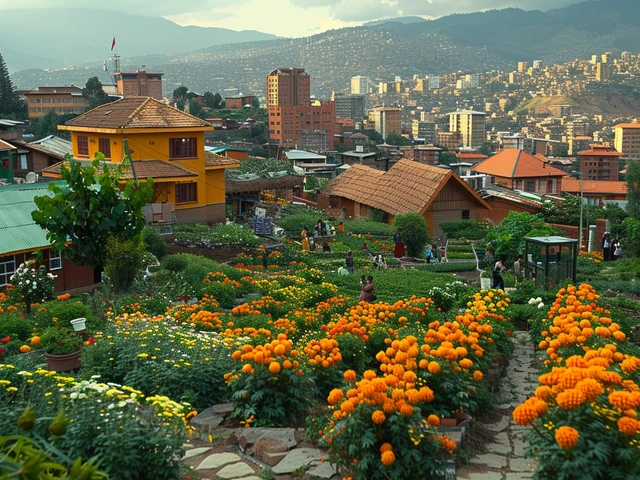 Best Business Opportunities in Ethiopia for 2024
Best Business Opportunities in Ethiopia for 2024
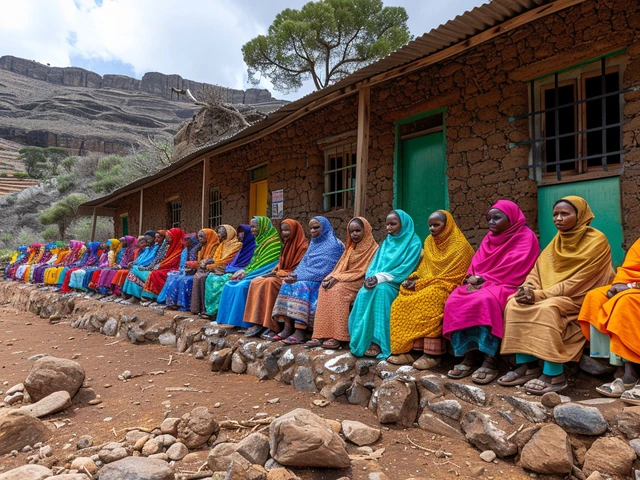 Is Healthcare Free in Ethiopia? Understanding the Costs and Accessibility
Is Healthcare Free in Ethiopia? Understanding the Costs and Accessibility
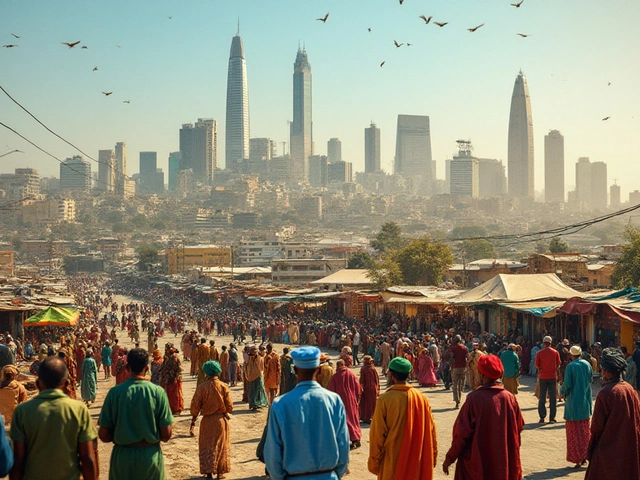 Investing In Ethiopia: How Much Do You Really Need?
Investing In Ethiopia: How Much Do You Really Need?
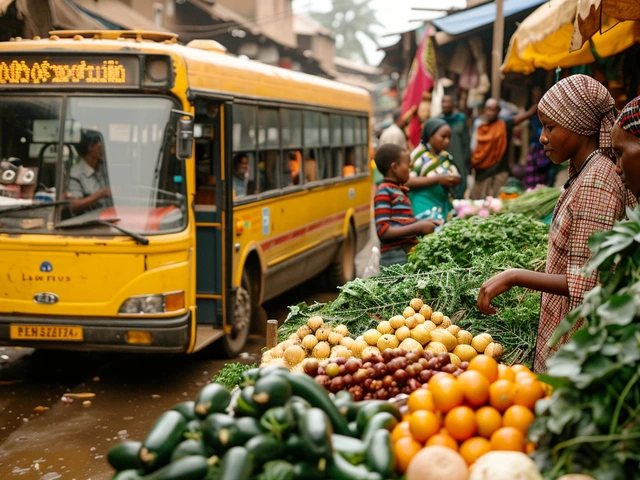 Living Comfortably in Ethiopia: How Much Money Do You Really Need?
Living Comfortably in Ethiopia: How Much Money Do You Really Need?
christine mae cotejo
May 21, 2024 AT 22:15When you stare at the tepid sunrise over the highlands of Ethiopia, you can almost hear the whispered promise of coffee beans yearning to be world‑class, a promise that has been fulfilled for centuries; the very soil seems to pulse with potential, inviting the bold to invest in its bounty.
The agricultural backbone is not merely a statistic, it is a living tapestry woven from the sweat of smallholder farmers and the ambition of modern agritech startups.
Imagine harnessing precision farming tools that monitor moisture and nutrient levels in real time, turning age‑old practices into data‑driven miracles.
This synergy between tradition and technology creates a fertile ground for exporters seeking premium teff, pulses, and specialty coffee that fetch top dollar on global markets.
Moreover, the Ethiopian government's Agricultural Transformation Agency is channeling resources into seed quality and market access, a move that has already lifted yields by roughly twenty percent over the past half‑decade.
In parallel, the burgeoning fintech scene, led by platforms like YenePay, is simplifying cross‑border payments, reducing friction for foreign buyers.
The textile sector, too, is undergoing a renaissance, with industrial parks such as Hawassa churning out ethically sourced fabrics that meet rigorous international standards.
International brands are increasingly scouting Ethiopian looms for their blend of craftsmanship and cost‑effectiveness, a trend that promises job creation and export growth.
Tourism, often overlooked by investors, provides a complementary revenue stream; the ancient rock‑hewn churches of Lalibela draw culturally curious travelers whose spending fuels hospitality and service sectors.
Infrastructure improvements, including runway upgrades at Addis Ababa Bole International Airport, are rapidly shrinking the logistical bottleneck that once deterred visitors.
The digital transformation wave, championed by the “Digital Ethiopia 2025” strategy, is laying down fiber optic highways that will connect remote farms to global markets, an essential step for e‑commerce and virtual trade fairs.
While challenges such as limited internet penetration and regulatory hurdles persist, the collaborative spirit between government, NGOs, and private investors is steadily carving pathways through these obstacles.
For the savvy trader, diversifying across agriculture, tech, textiles, and tourism offers a resilient portfolio that can weather macro‑economic swings.
The key is to partner with local cooperatives, leverage incubator networks like Iceaddis for tech insights, and stay attuned to policy shifts that can unlock new incentives.
In essence, Ethiopia stands at a crossroads where age‑old heritage meets cutting‑edge innovation, and those who act now can harvest the abundant returns that this unique market promises.
Douglas Gnesda
May 21, 2024 AT 22:16The integration of IoT sensors into smallholder plots is the epitome of a verticalized supply chain, enabling real‑time data ingestion that can be fed into predictive analytics dashboards for yield optimization.
Abhijit Pimpale
May 21, 2024 AT 22:56Ethiopia's coffee export value surpassed $900 million last fiscal year, reflecting robust demand from specialty roasters worldwide.
Eric DE FONDAUMIERE
May 21, 2024 AT 23:06Yo, that figure's lit, but don't forget the logistics cost-shipping from Djibouti can gnaw into margins if you ain't got a solid freight partner.
Pauline Herrin
May 21, 2024 AT 23:11While enthusiasm is commendable, a rigorous cost‑benefit analysis must precede any capital allocation to ensure sustainable returns.
pradeep kumar
May 21, 2024 AT 23:46The hype around Ethiopian tech is overblown; most startups lack scalable business models.
love monster
May 22, 2024 AT 00:20Don't let the skeptics drown out the genuine opportunities-Ethiopia's young, digitally‑savvy workforce is a catalyst for innovative ventures, especially in fintech and agritech, where localized solutions can bridge the gap between farms and markets.
Christian Barthelt
May 22, 2024 AT 00:28Contrary to popular sentiment, the regulatory environment remains opaque, and without clear licensing frameworks, foreign investors risk entanglement in bureaucratic red tape.
Ify Okocha
May 22, 2024 AT 00:53Most of the touted tourism growth is seasonal, and the infrastructure lag compromises visitor experience, undermining any long‑term profitability projections.